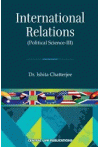- Author(s): Ishita Chatterjee
- Publisher: Central Law Publications
- Edition: 1 Ed 2025
- ISBN 13 9788119415861
- Approx. Pages 448 + Contents
- Format Paperback
- Approx. Product Size 24 x 16 cms
- Delivery Time 3-5 working days (within Kerala & South India) (Others 7-9 days)
- Shipping Charge Extra (see Shopping Cart)
............................................................................................................................
Description
In a world increasingly interconnected by the threads of globalization, technology, and communication, the study of international relations has techer been more pertinent. As we navigate through the complexities of the 21st century, understanding the dynamics that govern the interactions between nations is crucial not only for policymakers and academics but for every global citizen. This book seeks to illuminate the multifaceted nature of international relations, providing readers with a comprehensive guide to the theories, practices, and key issues that shape our global society.
As a field of study, international relations emerged from the ashes of the First World War, driven by the urgent need to understand the causes of conflict and the conditions for peace. Over the decades, it has evolved, incorporating diverse perspectives and methodologies. From the realist views of power politics and the liberal emphasis on international institutions to the constructivist focus on the social construction of international norms, the discipline has expanded to encompass a wide array of theoretical frameworks.
The core of this book is structured around these theoretical approaches, offering a detailed examination of how each perspective interprets global events and issues. The book begins with realism, the oldest and perhaps most influential theory in international relations. Realism's emphasis on the anarchic nature of the international system, state sovereignty, and the perpetual struggle for power provides a lens through which we understand the behaviour of states in times of conflict and cooperation.
Following the exploration of realism, the book delves into liberalism, which presents a more optimistic view of international relations. Liberalism highlights the role of international institutions, economic interdependence, and democratic governance in fostering cooperation and peace among states. This perspective offers valuable insights into the functioning of organizations such as the United Nations, the World Trade Organization, and the European Union, and their efforts to promote global stability and prosperity.
Constructivism, a relatively recent addition to the theoretical landscape, challenges the materialist foundations of realism and liberalism by emphasizing the importance of ideas, identities, and norms in shaping international relations. This approach underscores the role of social interactions and shared beliefs in the formation of state interests and behaviours, providing a deeper understanding of issues such as nationalism, human rights, and global governance.
............................................................................................................................
Contents
Unit I - International Relations
Unit II - Concepts of International Relations
Unit III - Approaches to the Study of International Relations
Unit IV - Evolution of International Relations till the 21st Century
Unit V - International Dynamics
Unit VI - International Organizations
Unit VII - Regional Organizations
Unit VIII - United Nations and International Relations
Unit IX - Foreign Policy and Diplomacy
Unit X - Peace and Conflict Studies
............................................................................................................................
Author Details
Ishita Chatterjee

